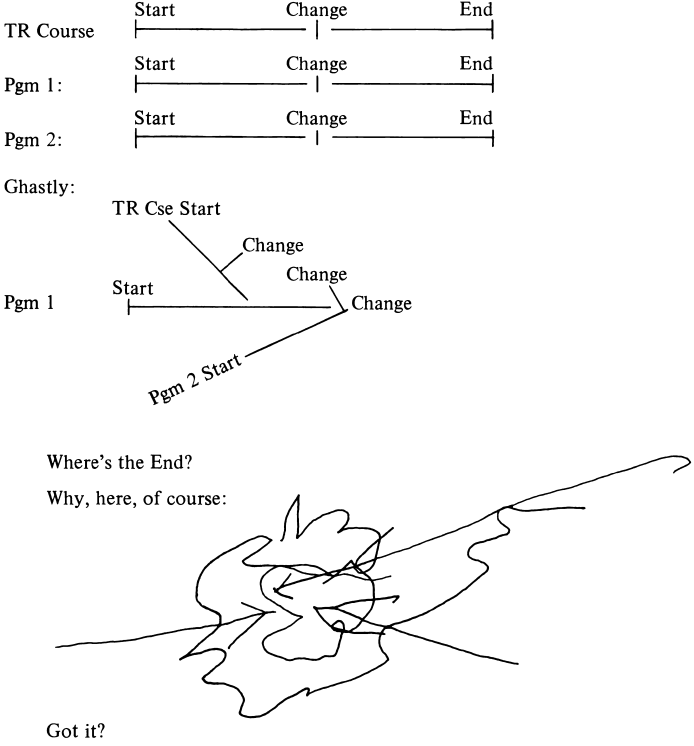

With the use of TRs The Hard Way on basic courses, auditors and students, a rule must be laid down:
A person on a TR course or in progress on a TR cycle may not also be audited.
And a second rule:
HGC admin and the DofP must be informed of enrollments on TR courses or TRs in cramming and must so mark a pc's folder with date.
And a third rule:
In an Advanced Org the Adv Cse Admin must also be informed of students enrolling on a TR course.
And a fourth rule:
A sign must be placed in Qual and in a TR classroom "While working on TRs and until they are passed, do not accept auditing. " In an AO or SH this reads "While working on TRs and until they are passed, do not accept auditing or do Solo. "
The reason for these rules lies in the major C/S rules:
Do not begin new programs to end old.
Do not start a new action before completing the existing one.
And the auditor rule:
Obtain an F/N before starting the next C/S action. If unable to do so, never begin the next C/S action but end session and return the folder to the C/S.
The surest way in the world to bog a case is to:
1. Begin a new process without obtaining an F/N on the one just run.
2. Begin a major action without completing the old one.
3. Begin a major action without setting up a case with ruds and F/Ns.
4. Begin a new program without completing the old one.
5. Start several programs without finishing any.
6. Enter a new major action into a case already in progress on another incomplete major action.
I have seen a case on as many as five major actions with none complete. And when I see this the first thing I take up is the first unflat incomplete program and get it finished, then the next, then the next. The case comes out all smooth.
Example: Case is on but not complete on Dianetic auditing. Switched to grades. Incomplete on grades, gets a Prog Pgm. Incomplete on a Prog Pgm, shifted to Power.
The only apparent exception is a repair. A case can be repaired if bogged providing the original action is rehabbed if O/R or completed to EP.
A Progress Pgm may reach EP before the written up program is completed.
Thus a Process Completion is defined as the End Phenomena of the process. A Program is complete when the End Phenomena of the Program is attained.
Any course or program containing TRs 0-4, 6-9 or Admin TRs is a major program in itself. It produces case gain — if run right — and has an End Phenomenon.
Further, by actual experience when a person is on a real (not a patty-cake and weak) TR Course and is also being audited at the same time, the C/S and Auditor if they don't know the person is also on TRs can be utterly baffled and worried as the case does not run right. "What did I do?" "What C/S was wrong?" "Look, his TA is high. " "Now it's low. " "Last session he____. " And the C/S and auditor engage in efforts to handle the odd case behavior. But the person, unknown to them, was also on a real TR Course and his case was changing!
You can also run into this same oddity with a mystic who does "bathe the body in light" every night or a wife whose husband audits her between HGC sessions or a self-auditor.
The principle is the same. The C/S and auditor are going down Wellbeing Street and hidden trucks keep dashing out of alleys and running into the pc.
The reason auditing should be done in intensive packages, not 1 hour a week or a session a month lies in the fact that life can run a new action in on a pc.
It's a great way to waste auditing to let a pc have a session once a week. You can't even keep his ruds in if he lives in any confusions.
So nothing is done for the case, all the auditing goes to handle the life interjections!
A case runs on cycles of actions. This is true in the auditing comm cycle. It is true in a process cycle. It is true in a program cycle.
New things being crossed into old incomplete things make a sort of ARC Break situation like a cut comm cycle.
One could do everything with a process or a program or a course that you find on an L1C. It would not be very wise.
No case gain can be created by lack of a comm cycle in an auditor, lack of an action cycle in processes or messing up a program cycle.
If you don't believe it, run an L1C on a pc with "Processes" and "Programs" and "Courses" as a prefix. You'd be amazed. Further the fellow who doesn't reach the EP of a Course is likely never to use that material or be faulty with the subject.
Usual study courses like admin or tech give case gain. One can carry on with auditing parallel to them. But still expect a case to change a bit by study and baffle a C/S once in a while. But a real TR Course produces changes up and down and up that are not possible to also audit around. So they don't mix.
To get a visual idea of this:
Optimum:
